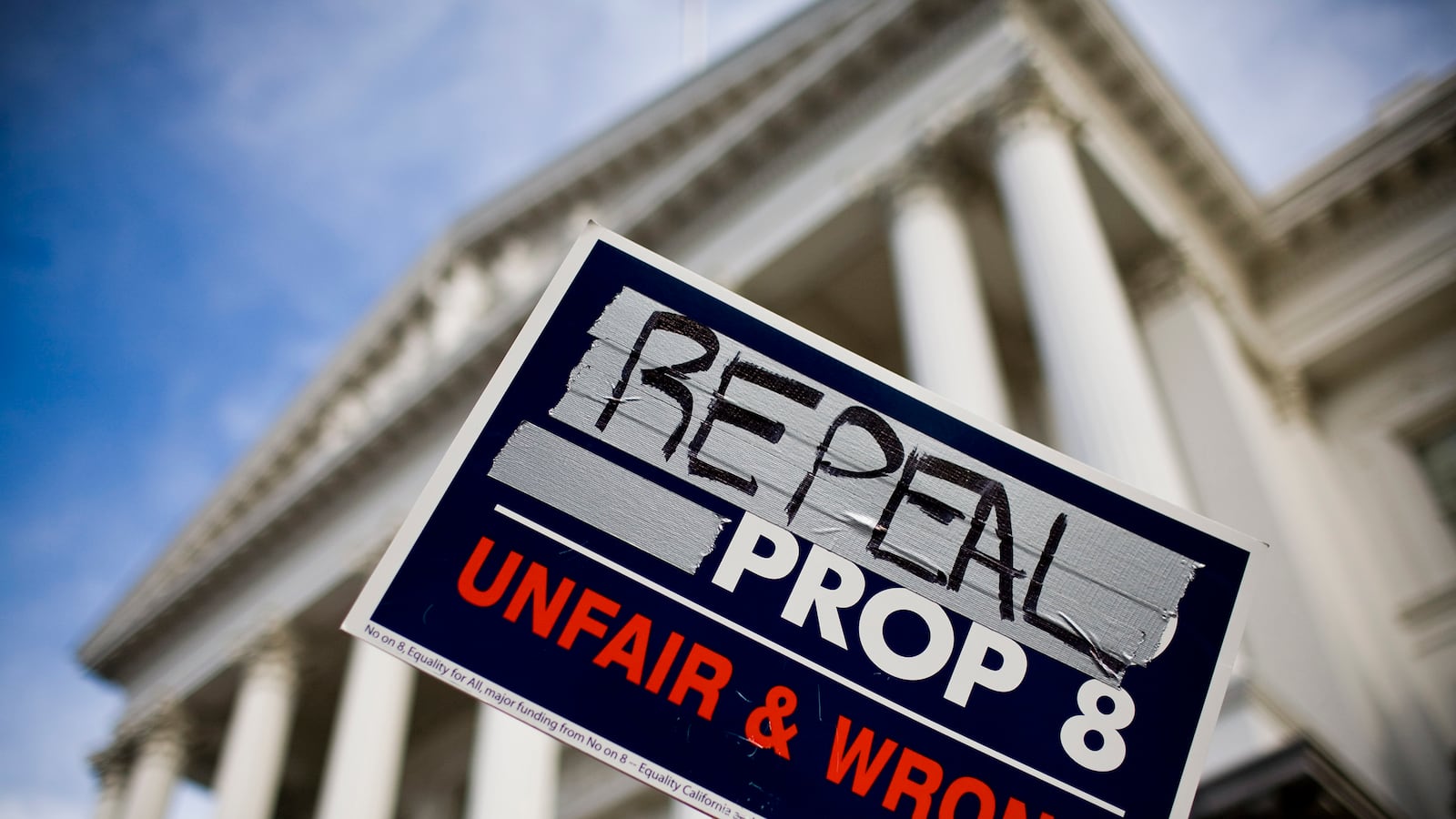A year ago this week, the Supreme Court struck down Proposition 8, a ballot measure in California that tried ban same-sex marriage in the state. In the lower court decision (which now governs after the Supreme Court’s ruling), Judge Vaughn Walker wrote, “Animus towards gays and lesbians or simply a belief that a relationship between a man and a woman is inherently better than a relationship between two men or two women, this belief is not a proper basis on which to legislate.” Proper? No. Constitutional? No. Upholding the values of equality and dignity for all that are the essence of our nation’s aspirations? Certainly not. But that didn’t stop backers of Prop 8 from making outlandish and offensive claims to push their agenda.
Yet fast forward and some of those virulent supporters of banning marriage equality have softened, if not outright changed their position. Let’s have a look at some prominent ones.
Newt Gingrich
My CNN colleague Newt Gingrich was Republican Speaker of the House when the Defense of Marriage Act was signed into law. In 2008, Gingrich produced a video supporting Prop 8 as a way to “stop imperial judges” and “protect marriage.”
But by 2012, Gingrich had… I think the popular word today is evolved. “The momentum is clearly now in the direction in finding some way to … accommodate and deal with reality. And the reality is going to be that in a number of American states — and it will be more after 2014 — gay relationships will be legal, period,” Gingrich told the Huffington Post. He said he still believes marriage is “defined as being between a man and a woman” but, according to the article, “suggested that the party (and he himself) could accept a distinction between a ‘marriage in a church from a legal document issued by the state’ — the latter being acceptable.” Gingrich is not exactly wearing rainbow spandex, but his position definitely shifted.
David Frum
David Frum is known as a conservative apostate, but not on every issue—he strongly opposes the immigration reform bill that passed the Senate, for example. So it once was with same-sex marriage. Way back in 1997, Frum wrote, “If we can give serious consideration to gay marriage today, it is only because we have lived through an intellectual revolution that has eroded society's understanding of the difference between a marriage and a love affair.”
By 2008, the year of Prop 8, Frum struck a more pragmatic tone, “[S]tate courts have set in motion a cultural conflict that will embitter Americans and pit them against each other for years. It’s now too late to prevent it and too baffling to imagine how to resolve it. So we are left with the even more daunting problem of finding ways to contain and mitigate it.” Not much softer, but softer.
But by 2011, Frum had entirely “evolved.” In an essay for CNN and follow up for The Daily Beast, Frum explains that he changed his tune basically because the rise in gay marriages didn’t lead to a crumbling of civilization.
Frum wrote, “As a conservative concerned with stabilizing families to rely less on government aid, I have been convinced: I've been worrying about the wrong thing. Stopping same-sex marriages does nothing to support families battered by economic adversity. Instead, it excludes and punishes people who seek only to live as conservatives would urge them to live.” Frum is embracing pulling gay folks into a socially conservative, hetero-normative version of marriage that makes me cringe, but regardless, the point is Frum pivoted, too.
Meg Whitman
When the former eBay executive ran for Governor of California in 2010, Meg Whitman was explicit in her support for Prop 8. And she criticized Governor Arnold Schwarzenegger and then-Attorney General Jerry Brown for not defending the ballot measure in the mounting legal challenges. In fact, the media hinted that Whitman took such a staunch anti-marriage equality stance to shore up her credentials with conservatives angered by her support for immigration reform and vow to address climate change.
But in 2013, Whitman was one of more than 75 prominent conservatives who signed a legal brief opposing Prop 8. Whitman, who lost the California governor’s race, explained, “I have come to embrace same-sex marriage after a period of careful review and reflection.” Like Frum, Whitman emphasized the conservative norms of marriage in rationalizing her shift: “It makes no difference whether the marriage is between a man and woman or a woman and woman. Marriage makes society better."
John Huntsman
This one is particularly interesting. After all, Huntsman — former Governor of Utah, Ambassador to China, and Republican candidate for President in 2012 — is a Mormon, just like Mitt Romney. Romney heftily supported Prop 8 — in 2008, his political action committee made a $10,000 under-the-radar donation to support Prop 8 and other anti-marriage equality advocacy.
As of 2011, Huntsman wasn’t backing marriage equality: “I believe in traditional marriage first and foremost. [...] But I also believe in civil unions.” But Huntsman was one of the conservatives who signed the Supreme Court amicus brief against Prop 8. In a 2013 essay, Huntsman wrote, “The party of Lincoln should stand with our best tradition of equality and support full civil marriage for all Americans.”
Romney, it should be noted, has not evolved.
It’s worth noting plenty of other conservatives, those directly involved with Prop 8 or on the periphery, have not evolved — John McCain, Rick Warren, Laura Ingraham and Bill O’Reilly to name a few. Some other conservatives maybe haven’t changed their core beliefs but have certainly softened their opposition, including Glenn Beck, Wisconsin Gov. Scott Walker and Sean Hannity, who on his website wrote, “While there is a lot of fervor over this issue right now, this is not a priority for the American people. That's not to belittle those who feel passionately about the issue, but Americans overall are not concerned about gay marriage as much as they are about the economy, jobs, and the debt.” Perhaps the worn-down enemy of equality is equality’s friend?
Or maybe conservatives are just pragmatic. Since Prop 8 was passed in the fall of 2008, the country has shifted seismically with respect to marriage equality. On November 4, 2008, when voters in California went to the ballot box to decide on Prop 8, there was only one state (Massachusetts) that recognized marriage between gay couples. California’s Supreme Court had also earlier in 2008 ruled in favor of marriage equality, partly prompting the ballot measure. Today, 19 states plus the District of Columbia have full marriage equality — and in 12 additional states, judges have ruled in favor of marriage equality and action on those decisions is pending appeals. In 2008, just 40 percent of Americans believed that marriage between same-sex couples should be fully and equally recognized under the law. Today, more than 55 percent of Americans support marriage equality.
According to one study, one in seven Americans reports changing her or his mind about marriage equality. More importantly, more than a quarter of marriage equality supporters say they have changed their minds on the issue. In other words, support for marriage equality is literally and measurably moving in the right direction.
And hopefully more and more conservatives will vocally stand up on the side of equality — or at least stop loudly shouting against it.





